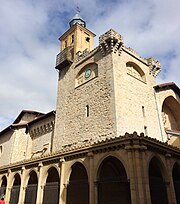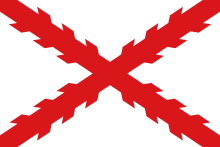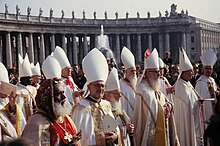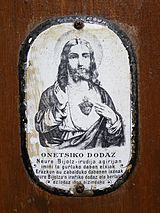Antonio Añoveros Ataún
[8] According to some sources he pursued law studies and sacerdotal education at the same time,[9] according to the other he abandoned university witnessing the rising tide of militant secularization; determined to confront it he returned to his native city and entered the seminar.
[25] He did show up in Madrid carrying out proselytizing activities once the city had been taken in 1939: he was noted as engaged in distribution of El Pensamiento Navarro, the sole Carlist daily spared amalgamation in the Francoist propaganda machinery.
[39] Himself coming from an accommodated family, Añoveros had already developed an interest in social issues when in the Pamplona seminary;[40] he pursued it animating the local Acción Católica, first during the Republic and later during the Civil War.
[43] At that time his relations with Spanish government seemed excellent: a former Carlist chaplain and mentor of Falangist youth cadres, in the early 1950s he was taking part in venerating ceremonies to honor Francisco Franco;[44] a photograph of Añoveros friendly chatting with the Caudillo was splashed across front pages upon his assumption of the Cádiz post.
On the central theme of the Church itself it was reduced to a petition, fathered by Añoveros jointly with the Jaca bishop Ángel Hidalgo Ibáñez, that the doctrine of Cuerpo Místico deserves more elaboration.
[54] Contributing to Declaration on Religious Freedom, (Dignitatis Humanae, 1965), and especially during the discussion on the so-called 4 SC (textus reemendatus), Añoveros spoke against the version prepared by the Council for Promoting Christian Unity and joined the 70-something group of bishops who formed part of the opposition nucleus.
[55] Though far from the fundamental rejection advocated by Marcel Lefebvre (or even critique from some fellow Spaniards like Abilio del Campo), Añoveros called for setting limits of religious liberty.
Up to a certain point Añoveros' focus on poverty, injustice, labor and social issues in general appeared to have been in line with the syndicalist Falangist viewpoint, but already when assisting Herrera Oria in Málaga his relations with the Movimiento were cooling.
[66] After the death of the conservative primate Enrique Pla y Deniel Añoveros became more vocal within the Spanish episcopate; he co-engineered condemnation of the official unions, declared by the Bishops Conference in July 1968.
[67] Gradually his articles in HOAC bulletins,[68] sermons and pastoral letters were assuming increasingly severe tone;[69] some references, like the ones about "the oppressed", were no longer compatible even with most flexibly applied official line.
[72] With the censorship almost lifted, in the late 1960s his sermons were getting widely quoted in the Spanish press; their author gained a nationwide recognition, e.g. declared Person of the Year by the Catalan periodical Mundo in 1970.
[74] This, combined with his focus on social issues and down-to-earth profile of a "parish bishop",[75] drew comparisons to Hélder Câmara, chief exponent of the Latin American so-called liberation theology,[76] though Añoveros never admitted to embracing the concept.
At the turn of the decade Spain's officials lost any illusions they might have had about Añoveros; at one point police suspected him of running a communist cell[77] and in 1971 Dirección General de Seguridad counted him, together with Vicente Tarancón and Narciso Jubany, among "jerarquías desafectas".
[83] He refused to attend official feasts along the Francoist hierarchs,[84] established a good working relation with the local vehemently pro-Basque clerical entourage,[85] and spoke in defense of persecuted nationalist clergymen;[86] he also did his best to derail legal proceedings against those charged with subversive propaganda, like in a 1973 case of 4 priests from Portugalete.
[87] The scarcely-veiled conflict with Francoist Spain exploded in February 1974, when Añoveros issued a pastoral letter titled El Cristianismo, Mensaje de Salvación para los pueblo.
[93] The cabinet of Carlos Arias ordered Añoveros' house arrest and sent a plane to Bilbao to fly him out into exile, while some bishops threatened excommunication of Francoist officials in return.
[94] Franco, aware of unofficial papal support for the bishop and asked for moderation by the primate González Martín,[95] has eventually overruled Arias and got the crisis defused while Añoveros was arranged to go on a long vacation.
[97] In the heat of the ongoing transición he tended to avoid political issues, though he used to meet new public officials;[98] his sermons and letters focused rather on the Church, stressing its holy nature and steering clear of social rationalizations.
Its 30th anniversary in 2014 produced some commemorative notes, all of them hailing the protagonist and crediting him for pro-democratic posture, social sensitivity, support for regional identities and endorsing a modern Church.
Within the Carlist realm already in 1974 he was considered a subversive progressist; a note by Traditionalist pundit Elías de Tejada ironically demanded that his call for honoring regional rights be met by restoring traditional Biscay regulations, which in turn would trigger fueros-based proceedings against Añoveros.
[120] They note that across the 1970s the bishops have never explicitly condemned the ETA terror campaign; while often voicing enigmatically against unspecified violence, they relativized the phenomenon by seeking its root causes in lack of civil liberties and heavy-handed policing.











